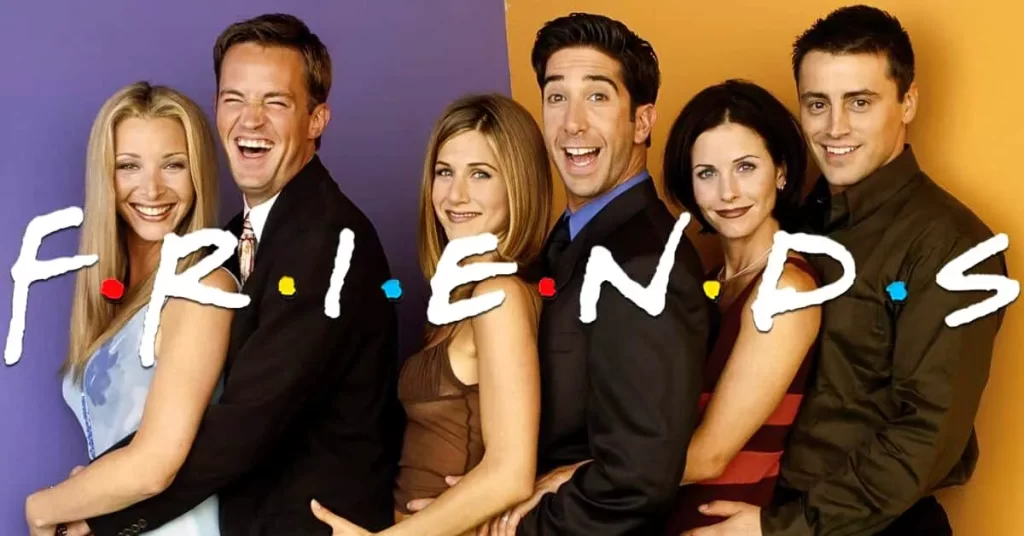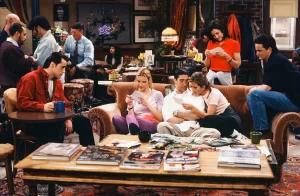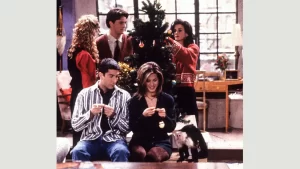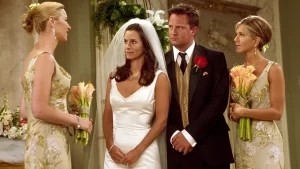
This week marks the 30th anniversary of the iconic sitcom Friends, a show that transcended the traditional sitcom format and redefined urban living for a generation. The series introduced audiences to relatable characters navigating the complexities of life, love, and friendship in New York City.
In the pilot episode, titled “The One Where Monica Gets a Roommate,” we meet Rachel Green, portrayed by Jennifer Aniston. She famously enters Central Perk in a wedding dress, having just fled her wedding to orthodontist Barry. This bold move symbolizes her quest for independence and a fresh start in the bustling city. Later, while sitting at Monica Geller’s kitchen table, Rachel faces the reality of severing financial ties to her family as she embarks on a new life with her friends. Monica’s quip, “Welcome to the real world. It sucks. You’re going to love it,” sets the tone for a series that would delve into the trials of adulthood.
Friends was revolutionary in portraying a group of young adults who relied on each other rather than traditional family structures. Created by Marta Kauffman and David Crane, the show emerged at a time when sitcoms predominantly focused on family life. Kauffman and Crane, having recently relocated to Los Angeles from New York, recognized the changing dynamics of friendship in urban settings, encapsulating this sentiment in their pitch: “It’s about friendship because when you’re single and in the city, your friends are your family.”

From the outset, the show explored the characters’ complex familial relationships. In the second episode, Phoebe reveals the trauma of her mother’s suicide, while Rachel learns about her parents’ divorce. Throughout the series, characters like Joey and Chandler grapple with their own challenging family backgrounds. As the group forges a family of choice, it becomes clear that friends often offer the support that biological families cannot. The Thanksgiving episode highlights this beautifully: as their original plans fall apart, the six friends end up together, emphasizing that they are each other’s chosen family.
While the characters lived in impossibly spacious apartments, their struggles with relationships, careers, and personal growth resonated deeply with viewers. For many in the ’90s, the experience of a prolonged adolescence—too old to live with family yet too young to start their own—meant that friendships were crucial for emotional support. Friends illustrated this reality with humor and heart, showcasing the challenges of adulthood while celebrating the bonds of friendship.

Throughout its ten-season run, Friends tackled various societal issues, from same-sex marriage to infertility. While it faced criticism for its lack of diversity and occasional insensitivity, it also paved the way for conversations about contemporary issues within a comedic framework. The series was one of the first to depict a same-sex wedding, featuring real-life activist Candace Gingrich, making strides even as it stumbled with some portrayals.
Critics argue that the show represented a middle-of-the-road approach, allowing it to resonate widely without alienating audiences. Its blend of humor and cultural commentary made it accessible, providing a platform for issues that were relevant to many young adults.
Despite its progressive moments, Friends ultimately returned to traditional values in its conclusion. In the series finale, Rachel sacrifices her career to reunite with Ross, while Monica and Chandler embrace suburban family life. Joey remains single, setting the stage for his spin-off series.
Even as Friends concluded, its influence lived on, inspiring numerous other shows like How I Met Your Mother and The Big Bang Theory. Its popularity has endured into the streaming era, with younger audiences discovering the series anew. In the UK, Friends was the most streamed show in 2018 and 2019, and its relevance surged again following the passing of Matthew Perry.

For many today, the notion of spending quality time with friends—uninterrupted by technology—feels increasingly aspirational. As Kauffman noted at the Tribeca TV Festival, Friends captures a fleeting moment in life when friendships often take precedence over familial obligations.
In an age of social media and digital connections, Friends serves as a reminder of the warmth and comfort of in-person relationships. For those who have experienced it, the series encapsulates a time when friends truly were family, resonating across generations and continuing to influence popular culture







